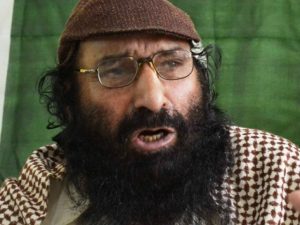 Islamabad: On 16 August, the United States state department designated Pakistan-based Hizbul Mujahideen (HM) as a foreign terrorist organisation.
Islamabad: On 16 August, the United States state department designated Pakistan-based Hizbul Mujahideen (HM) as a foreign terrorist organisation.
The US designation bans its citizens and residents from dealing with the group and any assets found to belong to the HM in areas under US jurisdiction will be frozen.
FIle image of Hizbul Mujahideen chief Sayeed Salahudeen. ANI
This move, a symbolic victory for India, comes just months after HM supremo Syed Salahuddin was designated a “global terrorist”.
This is particularly important because even as the US has shown a willingness to target anti-India terrorist groups such as the Lashkar-e-Taiba and the Jaish-e-Mohammed in Pakistan, it had hesitated to show the same willingness for a Kashmiri terror group.
While this was amenable for the Indian policymakers in the initial years of India-US strategic relationship, New Delhi could no longer turn a blind eye towards US reluctance.
Particularly as the HM, after remaining a depleted organisation for most of the late 2000s, acquired a renewed vigour post-2012 and specifically after the turbulent period of mass protests in Kashmir between 2008 and 2011.
Therefore this designation matters, even if it makes little practical difference to the HM’s activities in Pakistan-occupied Kashmir and the Valley. Syed Salahuddin, for instance, despite being designated as a global terrorist and under the radar of the Western intelligence agencies, still makes public appearances and continues to call for violence against India.
The designation also comes at a particularly difficult time for the HM as it is trying to maintain its recent ascendancy in the Valley and protect its turf from other terrorist groups such as the LeT, JeM and the recently formed Ansar Ghazwat-ul-Hind, an affiliate of Al-Qaeda.
While the group is getting a steady stream of recruits post the killing of Burhan Wani, sustaining these recruits and maintaining their expenses requires money.
But this is where the designation, combined with the recent crackdown by the National Investigation Agency on the separatist-terrorist funding nexus will hit the HM where it hurts: India is sure to use the designation to galvanise support against financing of terror outfits.
Of course, terrorist organisations such as the HM have sources of money outside the formal financial system — which the US designations typically tend to target — such as hawala.
And that is an ongoing battle: As evident from the NIA’s cases against the HM and efforts to develop closer relationship with like-minded countries in the Persian Gulf from where donations from religious charities make their way to Pakistan-based terror groups.
Leave a Reply